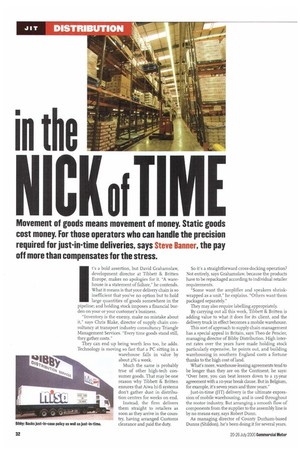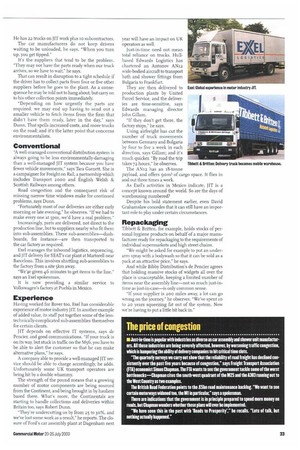in the
Page 34

Page 35

If you've noticed an error in this article please click here to report it so we can fix it.
11 C1(111
t's a bold assertion, but David Grahamslaw, development director at Tibbett & Britten Europe, makes no apologies for it. "A warehouse is a statement of failure," he contends. What it means is that your delivery chain is so inefficient that you've no option but to hold large quantities of goods somewhere in the pipeline; and holding stock imposes a financial burden on your or your customer's business.
"Inventory is the enemy, make no mistake about it," says Chris Blake, director of supply chain consultancy at transport industry consultancy Triangle Management Services. "Every time goods stand still, they gather costs."
They can end up being worth less too, he adds. Technology is moving so fast that a PC sitting in a warehouse falls in value by about 2% a week.
Much the same is probably true of other high-tech consumer goods. That may be one reason why Tibbett & Britten ensures that Aiwa hi-fl systems don't gather dust in distribution centres for weeks on end.
Instead, the firm delivers them straight to retailers as soon as they arrive in the country, having arranged Customs clearance and paid the duty.
So its a straightforward cross-docking operation? Not entirely, says Crahamslaw, because the products have to be repackaged according to individual retailer requirements.
Some want the amplifier and speakers shrinkwrapped as a unit," he explains. 'Others want them packaged separately."
They may also require labelling appropriately.
By carrying out all this work, Tibbett & Britten is adding value to what it does for its client, and the delivery truck in effect becomes a mobile warehouse.
This sort of approach to supply chain management has a special appeal in Britain, says Theo de Pencier, managing director of Bibby Distribution. High interest rates over the years have made holding stock particularly expensive, he points out, and building warehousing in southern England costs a fortune thanks to the high cost of land.
What's more, warehouse-leasing agreements tend to be longer than they are on the Continent, he says: "Over here, you can beat lessors down to a 15-year agreement with a 10-year break clause. But in Belgium, for example, its seven years and three years."
Just-in-time (JIT) delivery is the ultimate expression of mobile warehousing, and is used throughout the motor industry. But arranging a smooth flow of components from the supplier to the assembly line is by no means easy, says Robert Dunn.
As managing director of County Durham-based Dunns (Shildon), he's been doing it for several years.
He has 22 trucks on JIT work plus TO subcontractors, The car manufacturers do not keep drivers waiting to be unloaded, he says. "When you turn up, you get tipped."
Its the suppliers that tend to be the problem. "They may not have the parts ready when our truck arrives, so we have to wait," he says.
That can result in disruption to a tight schedule if the driver has to collect parts from four or five other suppliers before he goes to the plant. As a consequence he may be told not to hang about, but carry on to his other collection points immediately.
"Depending on how urgently the parts are required, we may end up having to send out a smaller vehicle to fetch items from the firm that didn't have them ready, later in the day," says Dunn. That spells increased costs, and more trucks on the road; and it's the latter point that concerns environmentalists.
Conventional
"A well-managed conventional distribution system is always going to be less environmentally-damaging than a well-managed JIT system because you have fewer vehicle movements," says Tara Garnett. She is a campaigner for Freight on Rail, a partnership which includes Transport 2000 and English Welsh & Scottish Railways among others.
Road congestion and the consequent risk of missing narrow time windows make for continued problems, says Dunn.
"Fortunately most of our deliveries are either early morning or late evening," he observes, if we had to make every one at 5pm, we'd have a real problem."
Increasingly, parts are delivered, not direct to the production line, but to suppliers nearby who fit them into sub-assemblies. These sub-assemblies—dashboards, for instance—are then transported to the car factory as required.
Exel manages the inbound logistics, sequencing, and JIT delivery for S EAT's car plant at Martorell near Barcelona. This involves shuttling sub-assemblies to the factory from a site 5km away.
"We've given 46 minutes to get items to the line," says an Exel spokesman.
It is now providing a similar service to Volkswagen's factory at Puebla in Mexico.
Experience
Having worked for Rover too, Exel has considerable experience of motor industry JIT. In another example of added value, its staff put together some of the lesstechnically-complicated sub-assemblies themselves for certain clients.
IT depends on effective IT systems, says de Pencier, and good communications. "If your truck is on its way, but stuck in traffic on the M56, you have to be able to alert the customer so that he can make alternative plans," he says.
A company able to provide a well-managed JIT service should be able to charge accordingly, he adds. Unfortunately some UK transport operators are being hit by a double whammy.
The strength of the pound means that a growing number of motor components are being sourced from the Continent, and being brought in by hauliers based there. What's more, the Continentals are starting to handle collections and deliveries within Britain too, says Robert Dunn.
"They're undercutting us by from 25 TO 30%, and we've lost some work as a result," he reports. The closure of Ford's car assembly plant at Dagenham next
year will have an impact on UK operators as well.
Just-in-time need not mean total reliance on trucks. Hullbased Edwards Logistics has chartered an Antonov ANi2 wide-bodied aircraft to transport bath and shower fittings from Bulgaria to Frankfurt.
They are then delivered to production plants by United Parcel Service, and the deliveries are time-sensitive, says Edwards managing director John Gillam.
"If they don't get there, the factory stops," he says.
Using airfreight has cut the number of truck movements between Germany and Bulgaria by four to five a week in each direction, says Gillam; and it's much quicker. "By road the trip takes 72 hours," he observes.
The ANtz has an t8-tonne payload, and offers go& of cargo space. It flies in and out three times a week.
As Excl.'s activities in Mexico indicate, JIT is a concept known around the world. So are the days of warehousing numbered?
Despite his bold statement earlier, even David Grahamslaw concedes that it can still have an important role to play under certain circumstances.
Repackaging
Tibbett & Britten, for example, holds stocks of personal hygiene products on behalf of a major manufacturer ready for repackaging to the requirements of individual supermarkets and high street chains.
"We might be asked for example to put an underarm spray with a bodywash so that it can be sold as a pack at an attractive price," he says.
And while Bibby Distribution's de Pencier agrees that holding massive stocks of widgets all over the place is unacceptable, keeping a limited number of items near the assembly line—not so much just-intime as just-in-case--is only common sense.
"If your supplier is 200 miles away, a lot can go wrong on the journey," he observes. "We've spent It) to 20 years squeezing fat out of the system. Now we're having to put a little bit back in."




















































































































